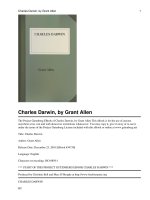The Project Gutenberg EBook of The Pit, by Frank Norris docx
Bạn đang xem bản rút gọn của tài liệu. Xem và tải ngay bản đầy đủ của tài liệu tại đây (2.21 MB, 1,146 trang )
The Project Gutenberg EBook of The Pit, by
Frank Norris
This eBook is for the use of anyone
anywhere at no cost and with
almost no restrictions whatsoever. You may
copy it, give it away or
re-use it under the terms of the Project
Gutenberg License included
with this eBook or online at
www.gutenberg.net
Title: The Pit
Author: Frank Norris
Posting Date: January 26, 2009 [EBook
#4382]
Release Date: August, 2003
First Posted: January 20, 2002
Language: English
*** START OF THIS PROJECT GUTENBERG EBOOK
THE PIT ***
Produced by Charles Aldarondo. HTML
version by Al Haines.
THE PIT
A STORY OF
CHICAGO
By
FRANK NORRIS
NEW YORK
1903
Dedicated to My Brother
Charles Tolman Norris
In memory of certain lamentable tales of
the round (dining-room) table heroes; of
the epic of the pewter platoons, and the
romance-cycle of "Gaston Le Fox," which
we invented, maintained, and found
marvellous at a time when we both were
boys.
Principal Characters in the Novel
CURTIS JADWIN, capitalist and
speculator.
SHELDON CORTHELL, an artist.
LANDRY COURT, broker's clerk.
SAMUEL GRETRY, a broker.
CHARLES CRESSLER, a dealer in grain.
MRS. CRESSLER, his wife.
LAURA DEARBORN, protege of Mrs.
Cressler.
PAGE DEARBORN, her sister.
MRS. EMILY WESSELS, aunt of Laura
and Page.
The Trilogy of The Epic of the Wheat
includes the following novels:
THE OCTOPUS, a Story of California.
THE PIT, a Story of Chicago.
THE WOLF, a Story of Europe.
These novels, while forming a series,
will be in no way connected with each
other save only in their relation to (1) the
production, (2) the distribution, (3) the
consumption of American wheat. When
complete, they will form the story of a
crop of wheat from the time of its sowing
as seed in California to the time of its
consumption as bread in a village of
Western Europe.
The first novel, "The Octopus," deals
with the war between the wheat grower
and the Railroad Trust; the second, "The
Pit," is the fictitious narrative of a "deal"
in the Chicago wheat pit; while the third,
"The Wolf," will probably have for its
pivotal episode the relieving of a famine
in an Old World community.
The author's most sincere thanks for
assistance rendered in the preparation of
the following novel are due to Mr. G. D.
Moulson of New York, whose unwearied
patience and untiring kindness helped him
to the better understanding of the technical
difficulties of a Very complicated subject.
And more especially he herewith
acknowledges his unmeasured obligation
and gratitude to Her Who Helped the Most
of All.
F. N.
NEW YORK
June 4, 1901.
CONTENTS
I II III IV V VI VII VIII IX X
CONCLUSION
I
At eight o'clock in the inner vestibule of
the Auditorium Theatre by the window of
the box office, Laura Dearborn, her
younger sister Page, and their aunt—Aunt
Wess'—were still waiting for the rest of
the theatre-party to appear. A great, slow-
moving press of men and women in
evening dress filled the vestibule from one
wall to another. A confused murmur of
talk and the shuffling of many feet arose on
all sides, while from time to time, when
the outside and inside doors of the
entrance chanced to be open
simultaneously, a sudden draught of air
gushed in, damp, glacial, and edged with
the penetrating keenness of a Chicago
evening at the end of February.
The Italian Grand Opera Company gave
one of the most popular pieces of its
repertoire on that particular night, and the
Cresslers had invited the two sisters and
their aunt to share their box with them. It
had been arranged that the party should
assemble in the Auditorium vestibule at a
quarter of eight; but by now the quarter
was gone and the Cresslers still failed to
arrive.
"I don't see," murmured Laura anxiously
for the last time, "what can be keeping
them. Are you sure Page that Mrs.
Cressler meant here—inside?"
She was a tall young girl of about
twenty-two or three, holding herself erect
and with fine dignity. Even beneath the
opera cloak it was easy to infer that her
neck and shoulders were beautiful. Her
almost extreme slenderness was,
however, her characteristic; the curves of
her figure, the contour of her shoulders,
the swell of hip and breast were all low;
from head to foot one could discover no
pronounced salience. Yet there was no
trace, no suggestion of angularity. She was
slender as a willow shoot is slender—and
equally graceful, equally erect.
Next to this charming tenuity, perhaps
her paleness was her most noticeable trait.
But it was not a paleness of lack of
colour. Laura Dearborn's pallour was in
itself a colour. It was a tint rather than a
shade, like ivory; a warm white, blending
into an exquisite, delicate brownness
towards the throat. Set in the middle of
this paleness of brow and cheek, her deep
brown eyes glowed lambent and intense.
They were not large, but in some
indefinable way they were important. It
was very natural to speak of her eyes, and
in speaking to her, her friends always
found that they must look squarely into
their pupils. And all this beauty of pallid
face and brown eyes was crowned by, and
sharply contrasted with, the intense
blackness of her hair, abundant, thick,
extremely heavy, continually coruscating
with sombre, murky reflections, tragic, in
a sense vaguely portentous,—the coiffure
of a heroine of romance, doomed to dark
crises.
On this occasion at the side of the
topmost coil, a white aigrette scintillated
and trembled with her every movement.
She was unquestionably beautiful. Her
mouth was a little large, the lips firm set,
and one would not have expected that she
would smile easily; in fact, the general
expression of her face was rather serious.
"Perhaps," continued Laura, "they would
look for us outside." But Page shook her
head. She was five years younger than
Laura, just turned seventeen. Her hair,
dressed high for the first time this night,
was brown. But Page's beauty was no less
marked than her sister's. The seriousness
of her expression, however, was more
noticeable. At times it amounted to
undeniable gravity. She was straight, and
her figure, all immature as yet, exhibited
hardly any softer outlines than that of a
boy.
"No, no," she said, in answer to Laura's
question. "They would come in here; they
wouldn't wait outside—not on such a cold
night as this. Don't you think so, Aunt
Wess'?"
But Mrs. Wessels, a lean, middle-aged
little lady, with a flat, pointed nose, had
no suggestions to offer. She disengaged
herself from any responsibility in the
situation and, while waiting, found a
vague amusement in counting the number
of people who filtered in single file
through the wicket where the tickets were
presented. A great, stout gentleman in
evening dress, perspiring, his cravatte
limp, stood here, tearing the checks from
the tickets, and without ceasing,
maintaining a continuous outcry that
dominated the murmur of the throng:
"Have your tickets ready, please! Have
your tickets ready."
"Such a crowd," murmured Page. "Did
you ever see—and every one you ever
knew or heard of. And such toilettes!"
With every instant the number of people
increased; progress became impossible,
except an inch at a time. The women were,
almost without exception, in light-
coloured gowns, white, pale blue, Nile
green, and pink, while over these
costumes were thrown opera cloaks and
capes of astonishing complexity and
elaborateness. Nearly all were bare-
headed, and nearly all wore aigrettes; a
score of these, a hundred of them, nodded
and vibrated with an incessant agitation
over the heads of the crowd and flashed
like mica flakes as the wearers moved.
Everywhere the eye was arrested by the
luxury of stuffs, the brilliance and
delicacy of fabrics, laces as white and
soft as froth, crisp, shining silks, suave
satins, heavy gleaming velvets, and
brocades and plushes, nearly all of them
white—violently so—dazzling and
splendid under the blaze of the electrics.
The gentlemen, in long, black overcoats,
and satin mufflers, and opera hats; their
hands under the elbows of their women-
folk, urged or guided them forward,
distressed, preoccupied, adjuring their
parties to keep together; in their white-
gloved fingers they held their tickets
ready. For all the icy blasts that burst
occasionally through the storm doors, the
vestibule was uncomfortably warm, and
into this steam-heated atmosphere a
multitude of heavy odours exhaled—the
scent of crushed flowers, of perfume, of
sachet, and even—occasionally—the
strong smell of damp seal-skin.
Outside it was bitterly cold. All day a
freezing wind had blown from off the
Lake, and since five in the afternoon a fine
powder of snow had been falling. The
coachmen on the boxes of the carriages
that succeeded one another in an
interminable line before the entrance of
the theatre, were swathed to the eyes in
furs. The spume and froth froze on the bits
of the horses, and the carriage wheels
crunching through the dry, frozen snow
gave off a shrill staccato whine. Yet for
all this, a crowd had collected about the
awning on the sidewalk, and even upon
the opposite side of the street, peeping and
peering from behind the broad shoulders
of policemen—a crowd of miserables,
shivering in rags and tattered comforters,
who found, nevertheless, an unexplainable
satisfaction in watching this prolonged
defile of millionaires.
So great was the concourse of teams,
that two blocks distant from the theatre
they were obliged to fall into line,
advancing only at intervals, and from door
to door of the carriages thus immobilised
ran a score of young men, their arms
encumbered with pamphlets, shouting:
"Score books, score books and librettos;
score books with photographs of all the
artists."
However, in the vestibule the press was
thinning out. It was understood that the
overture had begun. Other people who
were waiting like Laura and her sister had
been joined by their friends and had gone
inside. Laura, for whom this opera night
had been an event, a thing desired and
anticipated with all the eagerness of a girl
who had lived for twenty-two years in a
second-class town of central
Massachusetts, was in great distress. She
had never seen Grand Opera, she would
not have missed a note, and now she was
in a fair way to lose the whole overture.
"Oh, dear," she cried. "Isn't it too bad. I
can't imagine why they don't come."
Page, more metropolitan, her keenness
of appreciation a little lost by two years
of city life and fashionable schooling,
tried to reassure her.
"You won't lose much," she said. "The
air of the overture is repeated in the first
act—I've heard it once before."
"If we even see the first act," mourned
Laura. She scanned the faces of the late
comers anxiously. Nobody seemed to
mind being late. Even some of the other
people who were waiting, chatted calmly
among themselves. Directly behind them
two men, their faces close together,
elaborated an interminable conversation,
of which from time to time they could
overhear a phrase or two.
"—and I guess he'll do well if he settles
for thirty cents on the dollar. I tell you,
dear boy, it was a smash!"
"Never should have tried to swing a
corner. The short interest was too small
and the visible supply was too great."
Page nudged her sister and whispered:
"That's the Helmick failure they're talking
about, those men. Landry Court told me all
about it. Mr. Helmick had a corner in
corn, and he failed to-day, or will fail
soon, or something."
But Laura, preoccupied with looking for
the Cresslers, hardly listened. Aunt Wess',
whose count was confused by all these
figures murmured just behind her, began
over again, her lips silently forming the
words, "sixty-one, sixty-two, and two is
sixty-four." Behind them the voice
continued:
"They say Porteous will peg the market
at twenty-six."
"Well he ought to. Corn is worth that."
"Never saw such a call for margins in
my life. Some of the houses called eight
cents."
Page turned to Mrs. Wessels: "By the
way, Aunt Wess'; look at that man there by
the box office window, the one with his
back towards us, the one with his hands in
his overcoat pockets. Isn't that Mr.
Jadwin? The gentleman we are going to
meet to-night. See who I mean?"
"Who? Mr. Jadwin? I don't know. I don't
know, child. I never saw him, you know."
"Well I think it is he," continued Page.
"He was to be with our party to-night. I
heard Mrs. Cressler say she would ask
him. That's Mr. Jadwin, I'm sure. He's
waiting for them, too."
"Oh, then ask him about it, Page,"
exclaimed Laura. "We're missing
everything."
But Page shook her head:
"I only met him once, ages ago; he
wouldn't know me. It was at the Cresslers,









